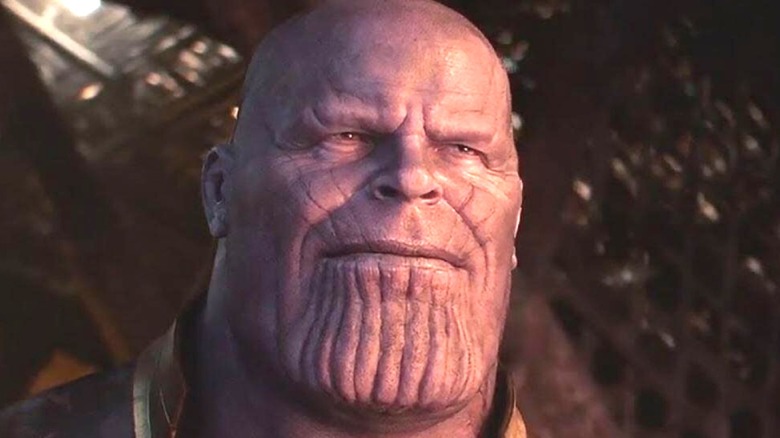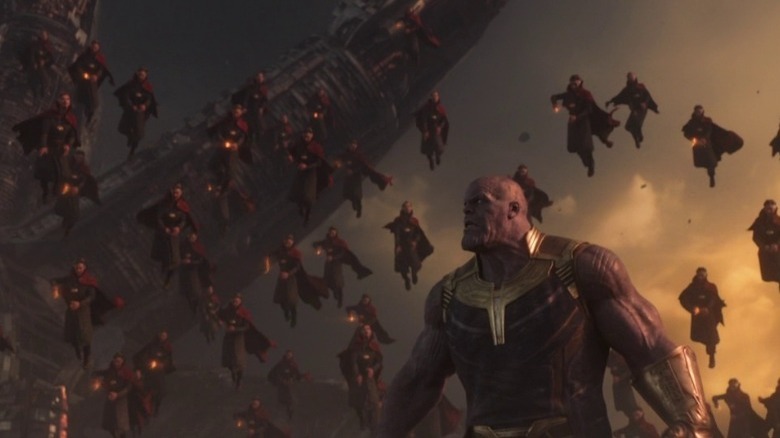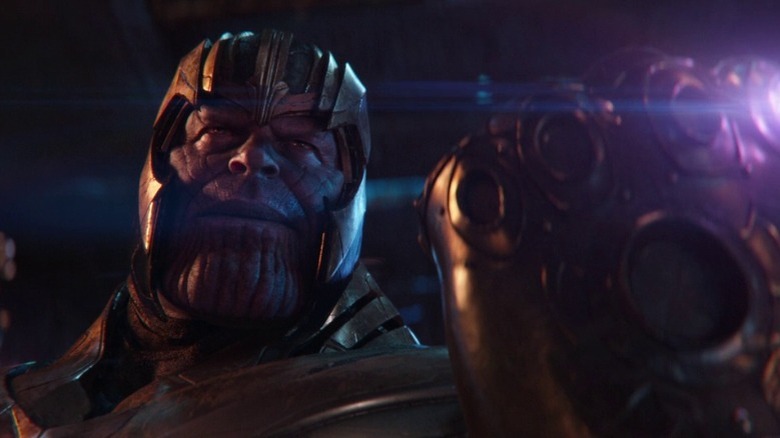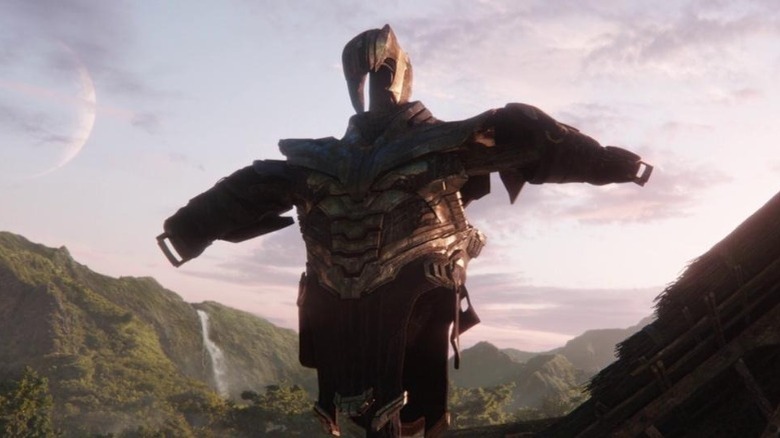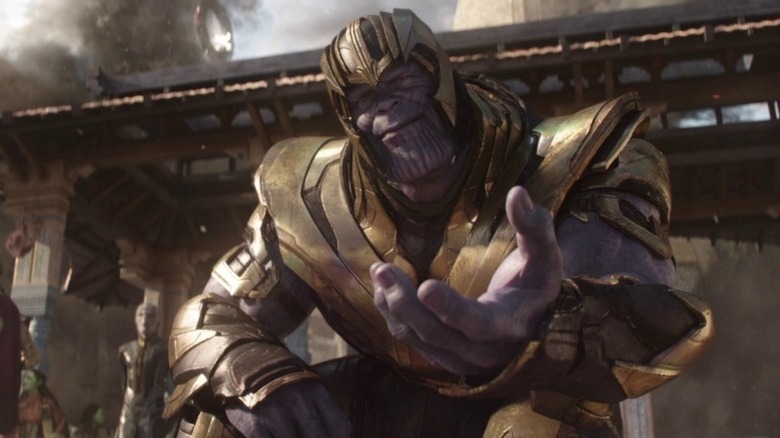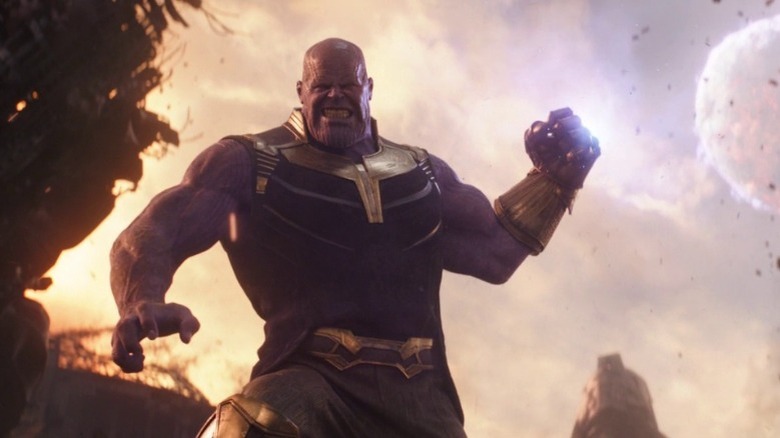How Thanos Was Even More Evil Than You Think
You'd think that committing the literal genocide of half the universe's population would be enough to sour people on a guy, but even the MCU's Dark Lord himself has his share of defenders.
Perhaps because of the way we're used to responding to fiction, the belief that Thanos is the de facto protagonist of "Avengers: Infinity War," with all the complexity and centrality of perspective that entails, resulted in many viewers being genuinely convinced that he "wasn't totally wrong." Others felt that he was flat-out right — in his single-minded quest to bring the world "balance" via random, equal-opportunity mass murder. Even Bradley Cooper joined in on the "Thanos had a point" bandwagon at the time of the movie (via BBC Radio 1 on YouTube).
But if we look past the veneer of performative "honor" and "neutrality" in which Thanos coated his behavior, it becomes clear that it was, simply put, not that deep. He wasn't some fair, dispassionate higher entity presenting the universe with a bitter medicine, not by any stretch of the imagination. He was just an overpowered jerk. And what really drove his actions was the lowliest, most insidious form of evil: an evil that disguised itself as righteousness.
His 'plan' was plainly nonsensical, and he ought to have known that
For starters, Thanos' plan was just bollocks. At best, it was a rehash of Malthusianism, an archaic population theory that has been debunked again and again (via Scientific American). Intelligent beings have, by definition, the means to optimize food and energy production and figure out better uses of available resources without resorting to extreme population control, let alone genocide. Even assuming overpopulation to be a problem, Thanos' idea was just a lazy substitute for a well-rounded solution.
Worse yet, it was not even an actual solution. If, per Kevin Feige, the Snap didn't just affect intelligent beings, but all forms of life including autotrophs like plants and bacteria, then it just spelled environmental chaos without improving anything (via Smithsonian). Even if the Snap had only affected intelligent lifeforms, it would change nothing in the long run, as populations would just grow back if given enough time. And even if they didn't, the dire macroeconomic consequences of such a mass tragedy would far outweigh any potential benefits.
Thanos should have known all of this, being as intelligent and resourceful as he was. If he really wanted to use the Infinity Stones' near-absolute power to save the world, he could have replaced oil rigs with massive solar power plants, or redistributed the tons of food that get hoarded and wasted every year in global supply chains, or obliterated the guns that curb dissent in commodity-exporting poor regions.
But those measures wouldn't have accomplished what he really wanted, which was to get off on his own power.
He was just going on a narcissistic power trip
As Thanos told Doctor Strange in "Infinity War," his home planet of Titan had "too many mouths, not enough to go around," which led to the mass extinction of his species. His root reason for wanting to exterminate half the universe's population, then, would be the fact that his own folk didn't listen to him when he proposed the same idea.
Though this seems to point to a genuine, well-meaning motivation behind Thanos' folly, it's actually evidence of the opposite. Instead of giving serious thought to the causes of the Titan people's downfall — which would necessarily have inspired a more sensible solution for the universe than "kill everyone now" — Thanos became narcissistically fixated on the fact that he wasn't listened to. His "plan" was really just a humongous power trip; he was going to do things his way this time, whether it worked or not, whether or not the rest of the universe wanted it.
This was made clear at the end of "Avengers: Endgame," when, faced with the failure of his plan, Thanos went full world-destroyer and vowed to wipe out every living being instead, so as to build a new, "grateful universe" from scratch. He never wanted to save anyone; he just wanted to live in a world where people gave him the appreciation and reverence he felt he was owed.
Worse yet, he was not even honest with himself or others about that. Instead, he put up a façade of "fairness" that made his hubris all the more infuriating.
Nebula was wrong: He did lie, a lot
When Thanos told the Avengers that he had destroyed the Infinity Stones, Nebula vouched for him. "My father is many things," she said. "A liar is not one of them." She might actually have believed that, given the degree to which Thanos was able to get into her head. But it was not true.
In fact, Thanos' whole "honorable savior" self-mythology had virtually no basis in reality. He won over armies and allies through his charisma but blithely deceived them into serving his own ends, such as by sending Ronan the Accuser to fetch the Orb without telling him it contained a Power Stone. He criticized Ronan's wasteful military violence but made use of identically callous tactics when Wanda overpowered him during the Battle of Earth. He made a show of honoring his word by not killing people he promised to spare, such as Thor in "Infinity War," yet mercilessly slaughtered the Dwarves of Nidavellir even after they followed his orders.
And, though he told Gamora that his massacre of half her race turned Zen-Whoberi into a "paradise," reality would not seem to bear that out, as the Russo brothers themselves have implied. All of which is not even getting into the hall of mirrors he made of Gamora and Nebula's lives, manipulating them to the point where they became mistrustful even of themselves.
He stooped so low because he viewed his own acts as godlike — writing straight with crooked lines, ends justifying the means. He was "not a liar" because, in his own words, "reality can be whatever I want."
He fancied himself a god
Like any murderous Knight Templar in history, Thanos started from the assumption that his actions were justified by the "greater good." But he was even more abject than your average totalitarian zealot because he didn't just see himself as a leader or savior: He saw himself as a literal god.
He had neither the omniscience nor the transcendental wisdom to actually be one, of course, as reflected by the awfulness of his master plan. But, as the universe's only remaining titan and de facto most powerful being, he had the luxury of not caring either way. All alone and insulated by his invincibility, he got to the point of seeing the whole of the cosmos as a mere chessboard on which to act out his whims, whatever they were. If he wanted to play-act at being on a world-saving quest, he could; his hypocrisy and self-delusion would bring him no real consequence.
That's why he dropped any pretense of saviorism and endeavored to simply rebuild the universe to his liking at the end of "Endgame." At that moment, he got tired of playing the "fixing the world" game and opted to knock down the pieces and start a new one, like a child switching over to Sandbox mode in a simulation game — the behavior of a complete sociopath. Even his affection for Gamora was possessive and utilitarian; she only mattered to him for the purposes, practical or emotional, that she served, as defined by him.
But it gets even worse: He also clearly enjoyed the suffering he caused.
His methods were cruel and sadistic to the hilt
"What I'm about to do to your stubborn, annoying little planet... I'm gonna enjoy it. Very, very much." That line alone should put to rest any of Thanos' claims about acting out a sense of duty to the universe, especially considering it was far from the only such cruel taunt he made throughout the MCU movies. In addition to being a narcissist and a sociopath, Thanos was a certified sadist.
After all, even if he were somehow saving the word with his plan, there was no practical need to murder half of the remaining Asgardians when he was already en route to doing the Snap, or to treat Nebula and his other children as horribly as he did throughout their lives. There was no real benefit to acting all polite and compassionate, besides shoving his victims' impotence and smallness in their faces. There was absolutely zero point to forcing Peter Quill and Wanda into immense psychological anguish — letting them, respectively, try to shoot Gamora and kill Vision by destroying the Mind Stone — if he was just going to use the Stones to render their actions moot.
His smile when strangling Loki in front of Thor, or Ebony Maw's command that his henchmen "let him have his fun" by fighting and beating the Hulk, say it all. At heart, Thanos was a bloodthirsty warmonger, even if he'd gotten better at disguising it with theatrics by "Infinity War." His duty was a whim, his honor was fake, and his methods were cruel. He wasn't inevitable; he was entitled.
